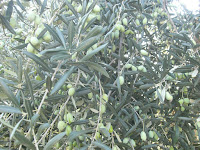


The olive trees are regenerating growth after the fire that razed our whole field (200 trees) a decade ago. We have cleared the land around 40 trees. The rest will have to wait. The fruit of the trees, the olive, does not ripen at the same time: some olives are black, while others are still green. But they are ready for picking for both table olives and olive oil.



The field was ploughed, and the earth was moved so that the olives now stand in step rows, rather than as one mass of trees like a forest. The ground is laid with black plastic nets, sewn together at their ends with wire, and pressed down with heavy stones. It may sound primitive, but this method has only been in use since the avialbalility of cheap nets, about 40 years ago. Before that, village women (my mother and her sisters) used to stand over the field with their back bent towards the ground, picking up every single olive from the earth. Back-breaking, poorly-paid work. No wonder my mother left Greece for New Zealand.


 Unfortunately, the rain has damaged some of the paths leading to the trees, creating deep ravines along the tracks. In some countries, this is called "art". The floor of Tate Modern, an art gallery in London, was recently dug up for an exhibition. Apparently, the deep ravines on the floor represented the divisions of society for newly arrived immigrants to Britain. A lot of money was paid to "set up" the floor to resemble the ravines in our fields, whereas we are going to have to pay a lot of money to fill them up...
Unfortunately, the rain has damaged some of the paths leading to the trees, creating deep ravines along the tracks. In some countries, this is called "art". The floor of Tate Modern, an art gallery in London, was recently dug up for an exhibition. Apparently, the deep ravines on the floor represented the divisions of society for newly arrived immigrants to Britain. A lot of money was paid to "set up" the floor to resemble the ravines in our fields, whereas we are going to have to pay a lot of money to fill them up...A lot of olive crop has also been lost due to lack of time and effort on our part. This makes us feel very sad, because we recelty bought 100 kilograms of olive oil to store in our house, for our daily cooking requirements; this oil could have come from our own trees. We also love to eat olives, and we could have put some more in lemon or salt if we had come to save the ones that were lost to the earth, but at least they will be providing good fertilisation for the filed, which is irrigated only by natural means, ie rain. We do not water the field at all.



The earth may look brown and dry, but the soil is still very fertile, and constantly producing nature'sl wonders. Stifno (deadly nightshade), radiki (dandelion) and tsohos (sowthistle) - all edible wild greens - are now flourishing on the paths. Our fields may be untended, but they will never be lost. And we aren't ready to sell them off to entrepreneurs who, in the most unlikely places of Western Crete, are building mansions with swimming pools for the rich retired northern Europeans. It is terribly tempting to dump this hard-to-work land and buy a luxury 4-wheel-drive SUV jeep, but if we hand no land to go to, then where would we drive with a fuel-consuming environmentally unfriendly monster?!



©All Rights Reserved/Organically cooked. No part of this blog may be reproduced and/or copied by any means without prior consent from Maria Verivaki.
See also:
A summer garden
A winter garden
An autumn garden
The rape of the countryside
Table olives
Beautiful land, and very cute kids. You are so right to keep the land instead of selling it, even with all the difficulties. Little by little, the crop will improve and pretty soon you can get your kids to help pick! (just a joke)
ReplyDeleteno, no, it's not a joke, they will have to one day!
ReplyDelete